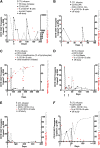Infusion of donor-derived CD19-redirected virus-specific T cells for B-cell malignancies relapsed after allogeneic stem cell transplant: a phase 1 study
- PMID: 24030379
- PMCID: PMC3811171
- DOI: 10.1182/blood-2013-06-506741
Infusion of donor-derived CD19-redirected virus-specific T cells for B-cell malignancies relapsed after allogeneic stem cell transplant: a phase 1 study
Erratum in
- Blood. 2014 May 22;123(21):3364
Abstract
Autologous T cells expressing a CD19-specific chimeric antigen receptor (CD19.CAR) are active against B-cell malignancies, but it is unknown whether allogeneic CD19.CAR T cells are safe or effective. After allogeneic hematopoietic stem cell transplantation (HSCT), infused donor-derived virus-specific T cells (VSTs) expand in vivo, persist long term, and display antiviral activity without inducing graft-vs-host disease; therefore, we determined whether donor VSTs, engineered to express CD19.CAR, retained the characteristics of nonmanipulated allogeneic VSTs while gaining antitumor activity. We treated 8 patients with allogeneic (donor-derived) CD19.CAR-VSTs 3 months to 13 years after HSCT. There were no infusion-related toxicities. VSTs persisted for a median of 8 weeks in blood and up to 9 weeks at disease sites. Objective antitumor activity was evident in 2 of 6 patients with relapsed disease during the period of CD19.CAR-VST persistence, whereas 2 patients who received cells while in remission remain disease free. In 2 of 3 patients with viral reactivation, donor CD19.CAR-VSTs expanded concomitantly with VSTs. Hence CD19.CAR-VSTs display antitumor activity and, because their number may be increased in the presence of viral stimuli, earlier treatment post-HSCT (when lymphodepletion is greater and the incidence of viral infection is higher) or planned vaccination with viral antigens may enhance disease control.
Trial registration: ClinicalTrials.gov NCT00840853.
Figures





References
-
- Martin TG, Gajewski JL. Allogeneic stem cell transplantation for acute lymphocytic leukemia in adults. Hematol Oncol Clin North Am. 2001;15(1):97–120. - PubMed
-
- Aricò M, Valsecchi MG, Camitta B, et al. Outcome of treatment in children with Philadelphia chromosome-positive acute lymphoblastic leukemia. N Engl J Med. 2000;342(14):998–1006. - PubMed
-
- Tomblyn M, Chiller T, Einsele H, et al. Center for International Blood and Marrow Research; National Marrow Donor program; European Blood and MarrowTransplant Group; American Society of Blood and Marrow Transplantation; Canadian Blood and Marrow Transplant Group; Infectious Diseases Society of America; Society for Healthcare Epidemiology of America; Association of Medical Microbiology and Infectious Disease Canada; Centers for Disease Control and Prevention. Guidelines for preventing infectious complications among hematopoietic cell transplantation recipients: a global perspective. Biol Blood Marrow Transpl. 2009;15(10):1143–1238. - PMC - PubMed
-
- Wingard JR, Hsu J, Hiemenz JW. Hematopoietic stem cell transplantation: an overview of infection risks and epidemiology. Hematol Oncol Clin North Am. 2011;25(1):101–116. - PubMed
Publication types
MeSH terms
Substances
Associated data
Grants and funding
LinkOut - more resources
Full Text Sources
Other Literature Sources
Medical

